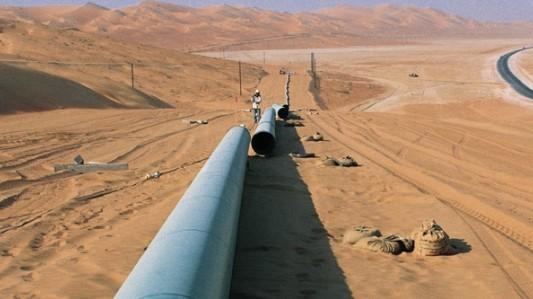Saudi Arabia Shuts Main Oil Pipeline After ‘Huthi Drone Attacks’

Representational image.
Riyadh: Drone attacks claimed by Iran-aligned Yemen rebels shut down one of Saudi Arabia's main oil pipelines Tuesday, further ratcheting up Gulf tensions after the mysterious sabotage of several tankers.
Days after the United States deployed bombers and an assault ship to bolster an aircraft carrier in the region, the world's largest crude exporter said two pumping stations had been targeted early Tuesday.
They lie on the East West Pipeline, able to pump five million barrels of oil a day from the oil-rich eastern province to a Red Sea export terminal.
The announcement came hours after Yemen's Huthi rebels said they had targeted vital installations in Saudi Arabia, which leads a military coalition against them.
Energy Minister Khalid al-Falih said Saudi Aramco had "temporarily shut down" the pipeline to "evaluate its condition" but added that oil production and exports had not been interrupted.
"The company (Saudi Aramco) is working on restoring the pumping station before resuming operations," he said in a statement carried by the official Saudi Press Agency.
The stations reportedly targeted lie west of Riyadh, at Dawadmi and Afeef.
Falih said Tuesday's incident was an "act of terrorism... that not only targets the kingdom but also the security of oil supplies to the world and the global economy".
Huthi spokesman Mohammed Abdusalam wrote on Twitter that the attacks were "a response to the aggressors continuing to commit genocide" against the Yemeni people.
Saudi Arabia and the United Arab Emirates intervened in the Yemen war to bolster the internationally-recognised government's efforts against the Huthis in March 2015.
The 1,200-kilometre pipeline reportedly hit Tuesday serves as an alternative for Saudi crude exports if the strategically vital Strait of Hormuz at the mouth of the Gulf were to be closed.
Iran has repeatedly threatened to close the strait in case of a military confrontation with the United States.
The reported pipeline attacks came after the UAE said four ships were damaged in "sabotage attacks" off the emirate of Fujairah, close to the Hormuz, on Sunday.
Washington and its Gulf allies stopped short of blaming Riyadh's regional arch-rival Tehran for the sabotage, but US President Donald Trump warned Iran against doing anything to harm US interests.
"If they (Iran) do anything, it would be a very bad mistake," Trump warned at the White House.
Iranian President Hassan Rouhani hit back, saying the Islamic republic was "too great to be intimidated by anyone".
The attacks came after the United States deployed the USS Abraham Lincoln carrier group, an amphibious assault vessel, a Patriot missile battery and B-52 bombers, triggering fears of a possible military confrontation.
The United Nations urged all sides to "exercise restraint for the sake of regional peace."
Oil prices initially spiked in response to news of the attacks, but were largely flat in trading on Tuesday.
Iran and the United States have engaged in a war of words in recent weeks since Tehran began to roll back commitments set out in a landmark 2015 nuclear deal with world powers.
Trump withdrew the United States from the deal last year and has unilaterally reimposed tough sanctions on Iran.
Get the latest reports & analysis with people's perspective on Protests, movements & deep analytical videos, discussions of the current affairs in your Telegram app. Subscribe to NewsClick's Telegram channel & get Real-Time updates on stories, as they get published on our website.
























